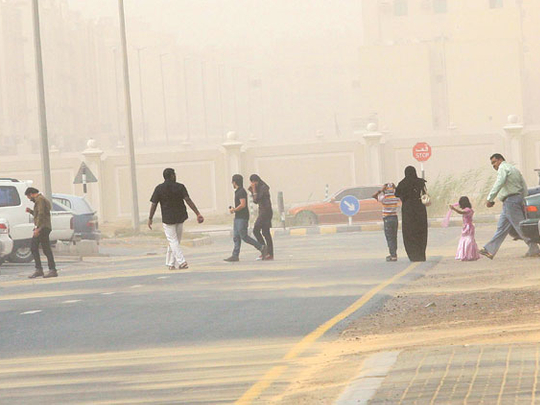
Dubai: Residents are urged to cover up their face, nose and mouth, and avoid walking through sandstorms as a precautionary measure against suffering from allergic rhinitis.
Allergic rhinitis is caused by allergens such as dust, plant and grass pollens, and fungi that travel during sandstorms, and causes people to suffer from a runny nose, itchy eyes, sneezing, congestion, and can also cause asthma among people who typically do not suffer from the disease. It may also be accompanied by symptoms affecting the eyes, ears, sinuses, throat and chest.
“During a storm, people should stay at home and not be in direct contact, but if they have to get out, they should cover their eyes, nose and mouth. These allergens that are picked up by sandstorms can affect the inner lining of the nose but there is medication to treat it, such as anti-histamine,” explained Dr Hussain Abdul Rahman, Director of Medical affairs and Head of the ENT Department at Dubai Hospital.
According to weather experts, sandstorms occur during the transitional period from winter to summer.
The National Centre of Meteorology and Seismology has predicted a sandstorm will hit the country on Friday until early Saturday morning, which in turn will cause dust particles to be spread across the emirates. The expected sandstorm will be brought in from Iraq and Jordan, and will make its way to Kuwait before hitting the UAE, with a chance of some rain.
“Sandstorms are a major cause of bacterial and viral infection particularly among those with weaker immune systems, such as children and the elderly, in addition to those with comprised immune systems,” he said.
Dr Abdul Rahman said that the latest statistics, which was carried out in 2009, found that 30 per cent of residents in Al Ain suffered from allergic rhinitis while only affecting 10 per cent of residents in Dubai and the rest of the country.
“People also have a higher risk to suffer from allergy rhinitis if they spend all their time indoors with the air conditioning on due to an increase in concentration of indoor pollutants, so they should regularly open the windows for fresh air,” he said.
Globally, it is estimated that over 400 million people suffer from allergies, with around one third of adult UAE residents having been diagnosed with allergic rhinitis. Meanwhile, one in five already suffers from asthma and an additional 40 per cent suffer from asthmatic episodes brought on by allergic rhinitis.
“On average, the UAE faces between eight to 10 severe sandstorms each year, which can last for several hours or sometimes even the whole day,” said Mazen Al Taruti, managing director of MSD Gulf, who pointed out that sandstorms are one of the main causes of allergic rhinitis.
“Because sandstorms have the ability to carry allergens over large distances, the risk of bacterial and viral infections greatly increases during this season,” he said.











